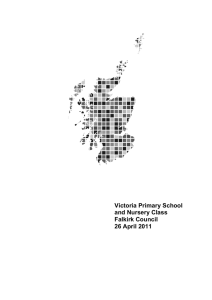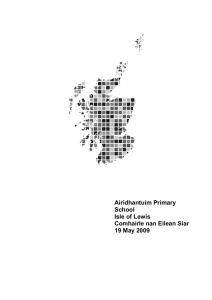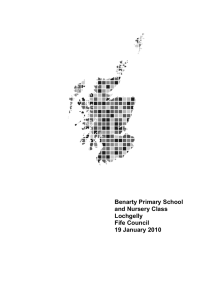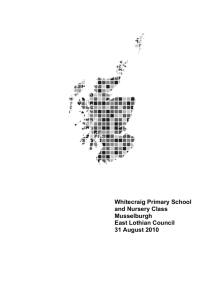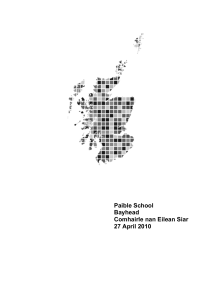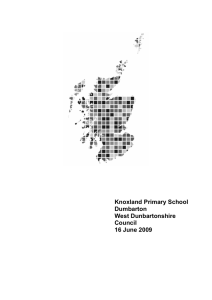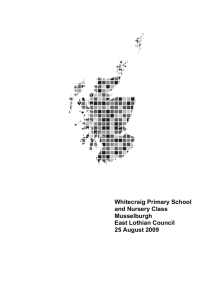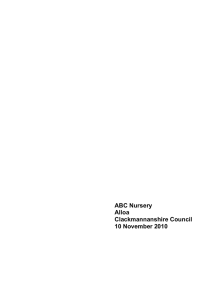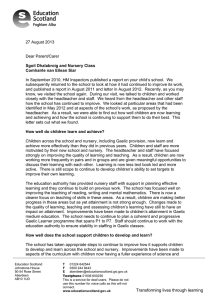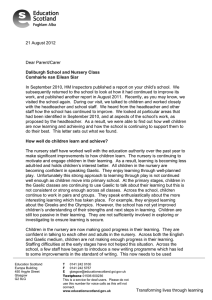Daliburgh School and Nursery Class South Uist
advertisement
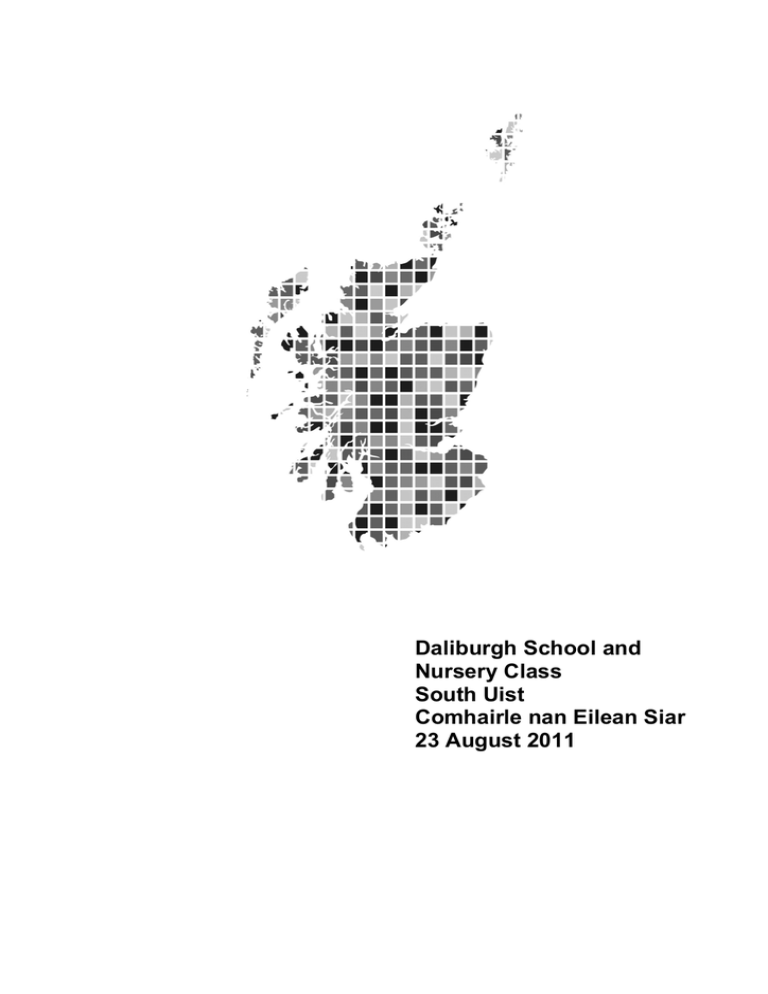
Daliburgh School and Nursery Class South Uist Comhairle nan Eilean Siar 23 August 2011 We published a report on Daliburgh School and Nursery Class in September 2010. That report set out key strengths of the school and areas for improvement. This follow-through report is based on an inspection visit which was carried out in May 2011. It tells you about improvements since the original inspection in the quality of education which the school1 provides. It also comments on how the school is getting on with the main points for action. First we focus on changes in the core work of the school. We explain how the school has got better at helping children to learn and benefit from being at the school. Next we look at the key processes which enable this to happen, including the involvement of parents2. Our report also describes developments in the ‘ethos’ of the school, by which we mean how well children are cared for and how much is expected of them in all aspects of school life. Finally we comment on improvements in leadership to help the school achieve its aims. A copy of this report has been placed on the HMIE website www.hmie.gov.uk. Where applicable, you will also find analyses of questionnaire returns. 1 2 The term ‘school’ is used to include the work of the nursery class, where relevant. Throughout this report, the term ‘parents’ should be taken to include foster carers, residential care staff and carers who are relatives or friends. Contents 1. The school 2. Particular strengths of the school 3. How well do children learn and achieve? 4. How well do staff work with others to support children’s learning? 5. Are staff and children actively involved in improving their school community? 6. Does the school have high expectations of all children ? 7. Does the school have a clear sense of direction? 8. What happens next? 1. The school Daliburgh School and Nursery Class serves the village of Daliburgh and the surrounding area in South Uist. Since the initial inspection the school has had two acting headteachers. The current acting headteacher will take up post of headteacher from August 2011. There is no longer a secondary stage within the school. The Gaelic medium nursery class now operates for morning sessions only. There have been a number of changes to the nursery staff team. 1 2. Particular strengths of the school • Staff teamwork in improving the school. • Use of the local environment to enhance learning. 3. How well do children learn and achieve? In the nursery class, children are content and settled. They play well together and enjoy their outdoor play. They need to have more experiences which assist them to develop their thinking. At the primary stages, children are eager to learn. They appreciate improvements, such as, more active approaches and practical work, which have made their learning more interesting. Children now learn together more often in pairs and in groups. They do not yet have an effective enough understanding of their strengths and next steps in learning. Children are developing their confidence well through taking on responsibilities for aspects of school life, such as, eco school activities. In the nursery class, children continue to listen well and have an appropriate understanding of the Gaelic spoken to them. At the primary stages, children in Gaelic medium are using Gaelic more often to talk about their learning. They review each other’s work and take part in collaborative activities. Across the primary stages, children are writing more regularly for different purposes. In mathematics, children need much more practice in basic skills, such as, the recall of multiplication facts. They are still not sufficiently quick and accurate in mental calculation. In the nursery class, staff still do not have a clear enough shared understanding of the curriculum they are expected to provide. At the primary stages, teachers are now providing children with a broad range of curricular experiences. They have improved their planning 2 and are taking account of Curriculum for Excellence. Staff have taken very positive steps to make learning more meaningful. For example, they have engaged children well in learning about the local environment. There is still scope to ensure that teachers continue to build on children’s prior learning. In the Gaelic medium classes, the school should continue to ensure that all aspects of the curriculum are delivered consistently through the medium of Gaelic. Across the school, approaches to ensuring that tasks and activities are at the right level of difficulty for children still require further improvement. 4. How well do staff work with others to support children’s learning? More parents are now interested in becoming involved in the Parent Council. The school has improved communication with parents, for example, through helpful newsletters and earlier notice about school events. The school does not have a system to record parental concerns and note actions taken. Staff should ensure that a system is put in place and that any concerns or complaints are followed up. 5. Are staff and children actively involved in improving their school community? Children now have more opportunities to be involved in the life of the school. For example, the pupil council selected a range of outdoor games for use at intervals. They take responsibility for ensuring these games are available and kept in good order. The school has taken positive steps to improve approaches to self-evaluation. Most staff are now more reflective about their practice and engage in professional discussion about learning with more confidence. All staff should build on the recently introduced useful approaches to monitoring and evaluating the work of the school. Staff should ensure that information gathered assists in identifying areas for improvement. 3 6. Does the school have high expectations of all children? Children are very well behaved and courteous. Staff’s higher expectations of children’s attendance have resulted in improvements. Attractive displays of children’s work now enhance the learning environment and raise the profile of achievement. Teachers need to increase their expectations of children’s achievement and work. 7. Does the school have a clear sense of direction? The nursery and the school have experienced significant changes since the original inspection. There is now a clearer sense of purpose and better teamwork among staff. Staff are committed to improving their practice and have visited other schools to learn from other colleagues. The newly appointed headteacher should now work with staff, parents and children to agree a vision for the school. The continued support of the education authority is required in assisting the school’s capacity for improvement. 8. What happens next? The school has improved areas of its work since the original inspection. There has not yet been enough improvement in key aspects of provision. As a result, we will continue to engage with the school and the education authority in monitoring progress. We will carry out a further follow-through visit to the school within one year of the publication of this report, and will report to parents on the extent of the improvement that has been achieved. HM Inspector: Noreen Connaughton 23 August 2011 4 When we write reports, we use the following word scale so that our readers can see clearly what our judgments mean. excellent very good good means means means satisfactory weak unsatisfactory means means means outstanding, sector leading major strengths important strengths with some areas for improvement strengths just outweigh weaknesses important weaknesses major weaknesses If you would like to find out more about our inspections or get an electronic copy of this report, please go to www.hmie.gov.uk. Please contact us if you want to know how to get the report in a different format, for example, in a translation, or if you wish to comment about any aspect of our inspections. You can contact us at HMIEenquiries@hmie.gsi.gov.uk or write to us at BMCT, HM Inspectorate of Education, Denholm House, Almondvale Business Park, Almondvale Way, Livingston EH54 6GA. Text phone users can contact us on 01506 600 236. This is a service for deaf users. Please do not use this number for voice calls as the line will not connect you to a member of staff. You can find our complaints procedure on our website www.hmie.gov.uk or alternatively you can contact our Complaints Manager, at the address above or by telephoning 01506 600259. Crown Copyright 2011 HM Inspectorate of Education
